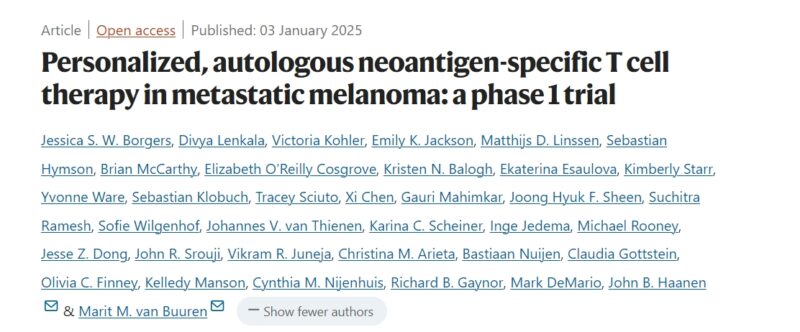
Marco Donia: Personalized T-cell therapy targeting neoantigens for patients with metastatic melanoma
Marco Donia shared on LinkedIn:
“Personalized Neoantigen-Specific T Cell Therapy for patients with Metastatic Melanoma (Phase 1)
(Free Access, Jessica Borgers et al., Nature Medicine, 3 Jan 2024).
Authors: Jessica S. W. Borgers, Divya Lenkala, Victoria Kohler, Emily K. Jackson, Matthijs D. Linssen, Sebastian Hymson, Brian McCarthy, Elizabeth O’Reilly Cosgrove, Kristen N. Balogh, Ekaterina Esaulova, Kimberly Starr, Yvonne Ware, Sebastian Klobuch, Tracey Sciuto, Xi Chen, Gauri Mahimkar, Joong Hyuk F. Sheen, Suchitra Ramesh, Sofie Wilgenhof, Johannes V. van Thienen, Karina C. Scheiner, Inge Jedema, Michael Rooney, Jesse Z. Dong, John R. Srouji, Vikram R. Juneja, Christina M. Arieta, Bastiaan Nuijen, Claudia Gottstein, Olivia C. Finney, Kelledy Manson, Cynthia M. Nijenhuis, Richard B. Gaynor, Mark DeMario, John B. Haanen, Marit M. van Buuren.

A groundbreaking study explores BNT221, a blood-derived, personalized T-cell therapy targeting neoantigens, for patients with metastatic melanoma who are resistant to standard therapies.
Key Findings:
- Safety Profile: BNT221, administered after lymphodepletion, was well tolerated, no dose limiting toxicities or cytokine release syndrome.
- Efficacy: Six of nine patients achieved stable disease, with tumor reduction observed in four patients; however, no objective responses were reported.
- T Cell Responses: Polyfunctional T-cell responses, including both de novo and pre-existing neoantigen-specific responses, were raised in all patients.
- Manufacturing: BNT221 was successfully manufactured for all 12 enrolled patients (9 treated). Average manufacturing time: 19.8 weeks.
Take Home Message:
Proof of concept for personalized T-cell therapy using neoantigen targets generated from a patient’s blood.
No objective responses were observed, prompting ongoing trials testing combinations with anti-PD-1 or IL-2 to enhance efficacy.
Long manufacturing time: not for patients who cannot wait; improvements warranted
About Neoantigen-Specific T Cell Therapy:
- Targeting neoantigens, arising from tumor-specific mutations, minimizes off-target effects and enhances therapeutic precision compared to broader T-cell strategies.
- BNT221 is generated from a patient’s blood through a process called NEO-STIM, which expands multiple neoantigen-specific T cells from the peripheral T cell pool.
- BNT221 belongs to the same class of treatments as TIL therapy (Tumor-Infiltrating Lymphocyte therapy, classified as Advanced Therapy Medicinal Products by EMA), which is already FDA-approved for melanoma. Learn more about TIL therapy.
Congratulations to the authors (corresponding: John Haanen and Marit van Buuren).”
Marco Donia is a Senior Consultant, Clinician-Scientist and Junior Research Group Leader (TIL group) at the Department of Oncology and Center for Cancer Immune Therapy, University of Copenhagen Herlev Hospital, Denmark. He serves as an Associate Professor in Clinical Oncology at the University of Copenhagen.
Donia is also a clinical oncologist treating patients with cancer immunotherapy. His research group is currently investigating new immune-regulatory circuits in PD-1/PD-L1 resistant tumors.
More posts featuring Marco Donia.
-
Challenging the Status Quo in Colorectal Cancer 2024
December 6-8, 2024
-
ESMO 2024 Congress
September 13-17, 2024
-
ASCO Annual Meeting
May 30 - June 4, 2024
-
Yvonne Award 2024
May 31, 2024
-
OncoThon 2024, Online
Feb. 15, 2024
-
Global Summit on War & Cancer 2023, Online
Dec. 14-16, 2023
